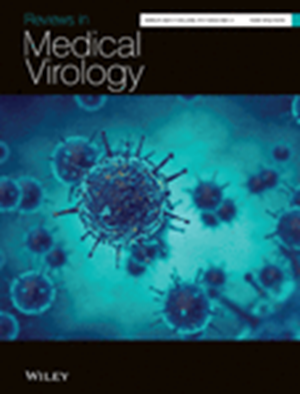An overview of SARS-CoV2 natural infections in companion animals: A systematic review of the current evidence
IF 9
2区 医学
Q1 VIROLOGY
引用次数: 0
Abstract
This systematic review provides a comprehensive overview of natural SARS-CoV-2 infections in companion animals. The findings show that these infections are relatively rare. Among the examined dogs, only 1.32% tested positive for SARS-CoV-2, while for cats, the rate was 1.55%. Infections in rabbits and ferrets were even less common, at less than 1%. These results support previous research indicating the infrequency of natural infections in companion animals. The review also includes updated studies that involved various pets, such as cats, dogs, ferrets, and rabbits. The majority of the studies analyzed were primarily concerned with screening pets that visited veterinary clinics, regardless of whether they showed any specific signs of SARS-CoV-2 infection. Only a limited number of studies investigated infections in animals suspected of being in contact with owners or other animals that had COVID-19 or were exhibiting symptoms. The most common variant identified among the SARS-CoV-2 variants in the reviewed studies was B.1.1.7 (alpha), followed by B.1.617.2 (delta), B.1.526 (Iota), and others. The emergence of these variants raises concerns about their potential for increased transmissibility and virulence, highlighting the importance of ongoing monitoring of SARS-CoV-2 infections in both humans and animals. Furthermore, most of the reviewed studies indicated that infected pets either showed no symptoms or experienced mild symptoms. This aligns with previous reports suggesting that animals infected with SARS-CoV-2 generally have less severe illness compared to humans. However, it is essential to recognize the possibility of severe illness or death in animals, particularly those with underlying health conditions. Continuous surveillance of SARS-CoV-2 infections in companion animals is crucial for better understanding the virus's epidemiology in animals and developing effective strategies to protect both animal and human health.伴侣动物 SARS-CoV2 自然感染概述:当前证据的系统回顾
本系统综述全面概述了伴侣动物自然感染 SARS-CoV-2 的情况。研究结果表明,这类感染相对罕见。在接受检查的狗中,只有 1.32% 的狗对 SARS-CoV-2 呈阳性反应,而猫的感染率为 1.55%。兔子和雪貂的感染率更低,不到 1%。这些结果支持了以前的研究,表明伴侣动物的自然感染并不常见。综述还包括涉及各种宠物(如猫、狗、雪貂和兔子)的最新研究。所分析的大多数研究主要是对到兽医诊所就诊的宠物进行筛查,而不管它们是否表现出感染 SARS-CoV-2 的具体症状。只有少数研究调查了怀疑与主人或其他感染 COVID-19 或出现症状的动物接触的动物的感染情况。在所审查的研究中,SARS-CoV-2 变体中最常见的变体是 B.1.1.7(alpha),其次是 B.1.617.2(delta)、B.1.526(Iota)等。这些变种的出现令人担忧它们可能会增加传播性和毒力,从而突出了持续监测人类和动物 SARS-CoV-2 感染的重要性。此外,大多数研究表明,受感染的宠物要么没有症状,要么症状轻微。这与之前的报告一致,即动物感染 SARS-CoV-2 后的病情通常没有人类严重。但是,必须认识到动物,特别是那些有潜在健康问题的动物,可能会出现严重疾病或死亡。持续监测伴侣动物感染 SARS-CoV-2 的情况对于更好地了解病毒在动物中的流行病学以及制定保护动物和人类健康的有效策略至关重要。
本文章由计算机程序翻译,如有差异,请以英文原文为准。
求助全文
约1分钟内获得全文
求助全文
来源期刊

Reviews in Medical Virology
医学-病毒学
CiteScore
21.40
自引率
0.90%
发文量
88
期刊介绍:
Reviews in Medical Virology aims to provide articles reviewing conceptual or technological advances in diverse areas of virology. The journal covers topics such as molecular biology, cell biology, replication, pathogenesis, immunology, immunization, epidemiology, diagnosis, treatment of viruses of medical importance, and COVID-19 research. The journal has an Impact Factor of 6.989 for the year 2020.
The readership of the journal includes clinicians, virologists, medical microbiologists, molecular biologists, infectious disease specialists, and immunologists. Reviews in Medical Virology is indexed and abstracted in databases such as CABI, Abstracts in Anthropology, ProQuest, Embase, MEDLINE/PubMed, ProQuest Central K-494, SCOPUS, and Web of Science et,al.
 求助内容:
求助内容: 应助结果提醒方式:
应助结果提醒方式:


